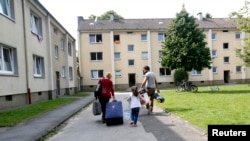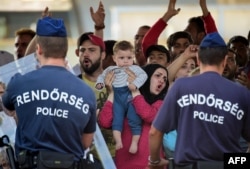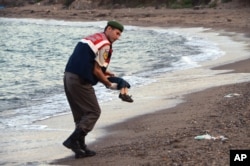Frustrated by the European Union's response to a deepening migration crisis yet inspired by a groundswell of support from citizens across Europe, British professor Michael Stewart set up a Facebook group for people to share their homes with refugees.
Having only created the group late on Wednesday, the 56-year-old Londoner said he was heartened to find hundreds of users joined within 24 hours and offered spare rooms, sofas or donations towards hosting if they did not have the space.
"The power of social media has united people from all across Britain and Europe and brought us together to do something extraordinary and offer support and solidarity to those in need," Stewart told the Thomson Reuters Foundation.
Hundreds of thousands of refugees fleeing wars and economic migrants escaping poverty have arrived in the European Union with chaos this week at Budapest's main railway station becoming the latest symbol of Europe's burgeoning migration crisis.
Thousands have died at sea and scores perished on land, with images of a drowned three-year-old Syrian boy washed up on a Turkish beach provoking a public outcry across the continent.
The influx has strained the EU's asylum system to breaking point, sowing division among its 28 nations, which have taken sharply opposing positions on whether to offer welcome.
But Stewart believes a surge of support from Internet users across Europe — from online petitions and Facebook groups to matchmaking services described as "AirBnB for refugees" — will increase pressure on politicians to take action.
The hashtag #refugeeswelcome was the top trending search on Twitter on Thursday — with more than 100,000 tweets — as people shared messages of support on the microblogging website.
"Online backing, and tens of thousands of people offering their homes to refugees, could put unbearable pressure on the British government and make its stance untenable," he said.
Britain has accepted just 216 Syrian refugees under a U.N.-backed relocation scheme, as well as around 5,000 that managed to reach Britain and apply on their own, and Prime Minister David Cameron said on Wednesday the answer was not to take more refugees but to bring peace and stability to the Middle East.
Europe-wide solidarity
Stewart said he felt compelled to act after reading an open letter on a Facebook group set up in Iceland which called on the government to take in more people escaping the Syrian conflict.
The government had earlier announced plans to take in 50 Syrian refugees, but some 15,000 people — five percent of Iceland's population — have joined the page, prompting the government to scrap that figure and reconsider its stance.
The page has been inundated with offers of housing, clothing, food, and donations, not only from Icelanders but people from across the world.
"Often, I find it difficult to make ends meet and need assistance from social services... [but] despite having little, I'm all ready to help. I'm willing to give clothing, food, toys, household appliances and the use of my home," one woman posted.
A German group, Refugees Welcome, which acts as a matchmaker for citizens willing to share their homes with refugees, has housed some 135 refugees to date, including people fleeing Afghanistan, Mali, Nigeria, Pakistan, Somalia and Syria.
The project said it had been overwhelmed with support — with hosts ranging from PR consultants and carpenters to students — and received offers of help to set up similar schemes in other countries, including Greece, Portugal and Britain.
While the migration crisis has divided politicians and fueled the rise of right-wing populists, it has also inspired an outpouring of public support and activism across Europe.
Football fans in Germany held up banners at matches last weekend welcoming those fleeing persecution, while 20,000 people demonstrated in Vienna earlier this week after 71 bodies were found in the back of an abandoned truck in Austria.
In Britain, a plan to march next week through London to show solidarity with refugees was gaining traction on Facebook, and a petition on parliament's website to accept more refugees had garnered more than 200,000 signatures.
Thomas Wenn, one of the thousands of Britons offering to host refugees through websites and Facebook groups, hailed the impact of social media but said it was unfortunate that it had taken the image of a dead child to engage the public.
"Passive activism can do only so much, if we can directly help people then it would be far more helpful than just demanding that our government do something," Wenn, 32, who is self-employed, told the Thomson Reuters Foundation.







